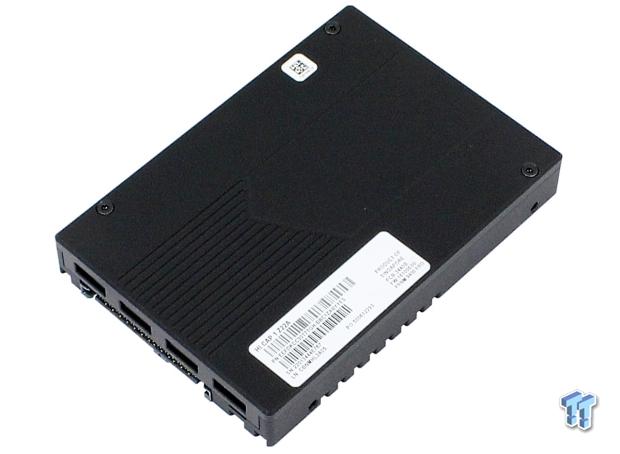
The Bottom Line
Pros
- Server workloads
- Efficiency
- Capacity
Cons
- None
Should you buy it?
AvoidConsiderShortlistBuyIntroduction and Drive Details
Having just tested the highest performing PCIe Gen4 SSD we've ever come across, Micron's 9400 Pro 7.68TB, we are back with more, a lot more. Micron's 30.72TB 9400 Pro is the highest capacity TLC SSD we've come across at 4x the capacity of any Enterprise SSD we've tested previously. This ultra-high-capacity SSD packs all that storage potential into the very same footprint as the 7.68TB model, being a 15mm U.3 enclosure. Unprecedented in every way, indicating to us that it is likely the world's most efficient SSD in terms of TCO, which is the primary consideration for a datacenter SSD, with footprint per petabyte being of paramount importance.
Micron's 9400 series of enterprise SSDs are designed to manage the most demanding datacenter workloads, including artificial intelligence, machine learning, and high-performance computing applications. The 9400 series is capable of delivering an unprecedented 1.6 million IOPS over PCIe Gen4 and sequential write throughput of up to 7,000 MB/s. As we found out, with its lower capacity sibling, the 9400 Pro delivers, as far as we know, the highest IOPS per watt efficiency for an SSD of its kind in the industry. The 9400 series enables a wide range of datacenter workloads and does so with the right blend of performance, capacity, and endurance.
Micron's 9400 Pro Series is being launched alongside a write-intensive version designated as the 9400 MAX. The more heavily overprovisioned MAX version is rated for three drive writes per day, whereas the Pro is rated for one drive write per day. Read performance for both versions is identical, but steady-state write performance for the MAX version is double that of the Pro, offering up to 600,000 IOPS.
The 30.72TB model we have in for testing today is, according to factory specs, capable of delivering up to 1.5 million IOPS, or 100K IOPS less than its lower capacity siblings at 7.68 and 15.36TB. However, we are talking about 30.72TB inside the same footprint and all that flash chugging away at record levels of performance and within basically the same power envelope, making it, as we see it, the Master of Efficiency.
Specs/Comparison Products
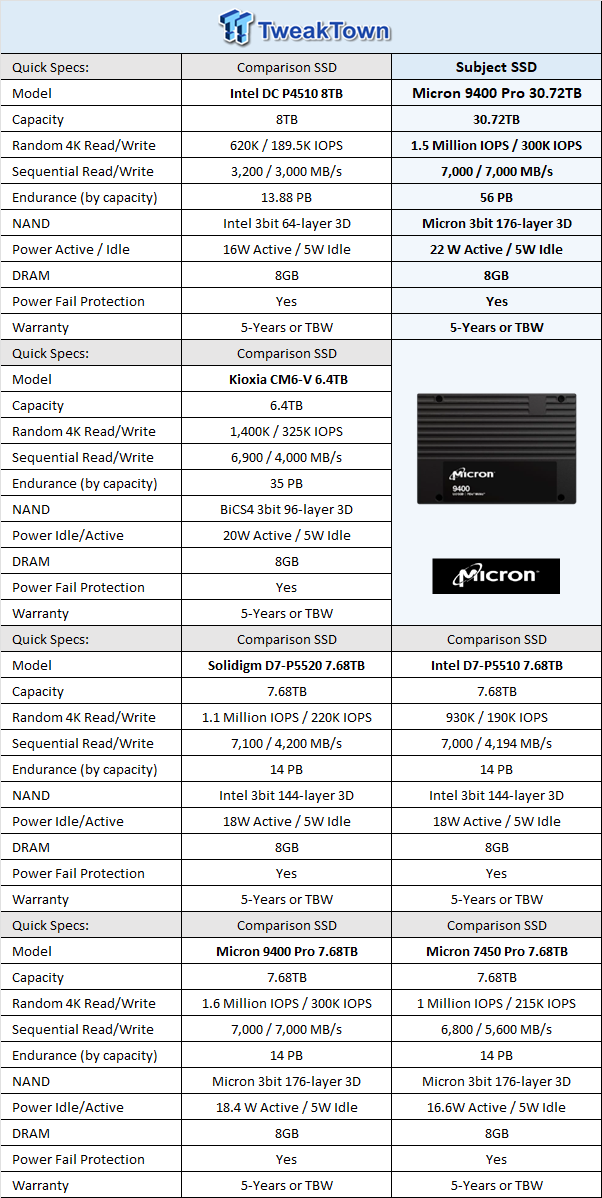
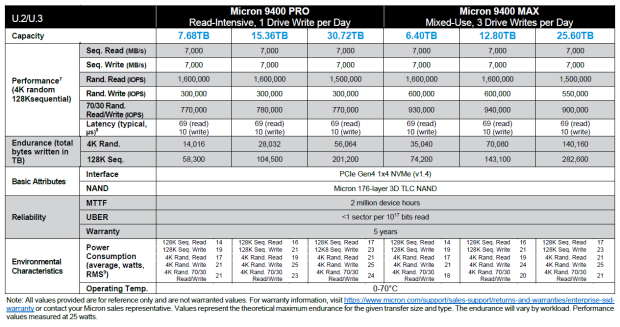
Micron 9400 Pro 30.72 TB NVMe PCIe Gen4 x4 U.3 SSD
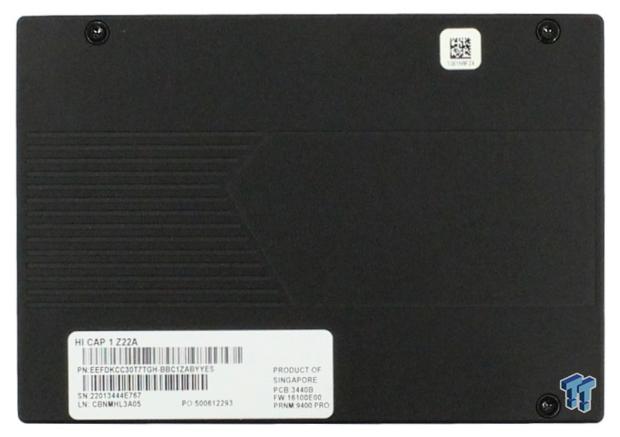
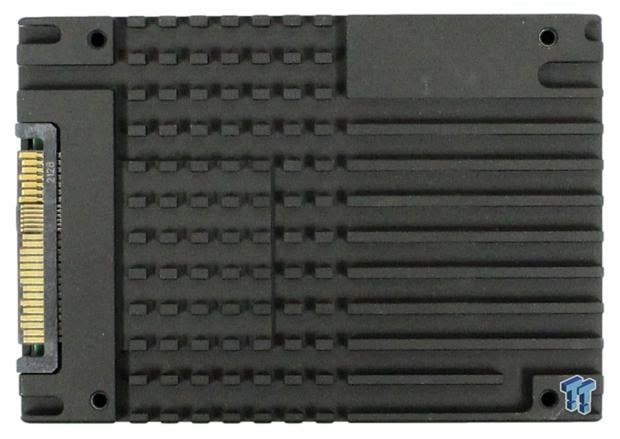
The top of the drive's aluminum alloy enclosure is typical for a 9000 series SSD. The underside is a deeply finned cast aluminum piece that serves as a heatsink.
Enterprise Testing Methodology
TweakTown strictly adheres to industry-accepted Enterprise Solid State Storage testing procedures. Each test we perform repeats the same sequence of the following four steps:
- Secure Erase SSD
- Write the entire capacity of SSD a minimum of 2x with 128KB sequential write data, seamlessly transition to the next step
- Precondition SSD at maximum QD measured (QD32 for SATA, QD256 for PCIe) with the test-specific workload for a sufficient amount of time to reach a constant steady-state, seamlessly transition to the next step
- Run test-specific workload for 5-minutes at each measured Queue Depth, and record results

| Today | 7 days ago | 30 days ago | ||
|---|---|---|---|---|
| $1799.99 USD | $1750 USD | |||
| $4415.18 CAD | $3870.17 CAD | |||
| £1999.99 | £1999.99 | |||
| $1799.99 USD | $1750 USD | |||
|
* Prices last scanned on 3/6/2025 at 4:32 pm CST - prices may not be accurate, click links above for the latest price. We may earn an affiliate commission from any sales.
|
||||
Benchmarks - Random and Sequential Performance
4K Random Write/Read
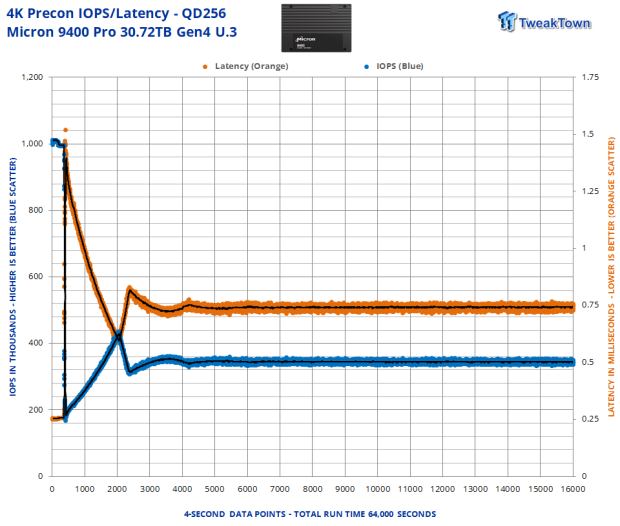
We precondition the drive for 64,000 seconds, receiving performance data every 4-seconds (16,000 data points). We plot this data to observe the test subject's descent into steady-state.
Steady-state is achieved at 28,000 seconds of preconditioning. Average steady-state write performance at QD256 is approximately 345K IOPS. The extremely tight pattern with virtually no outliers indicates high QoS.
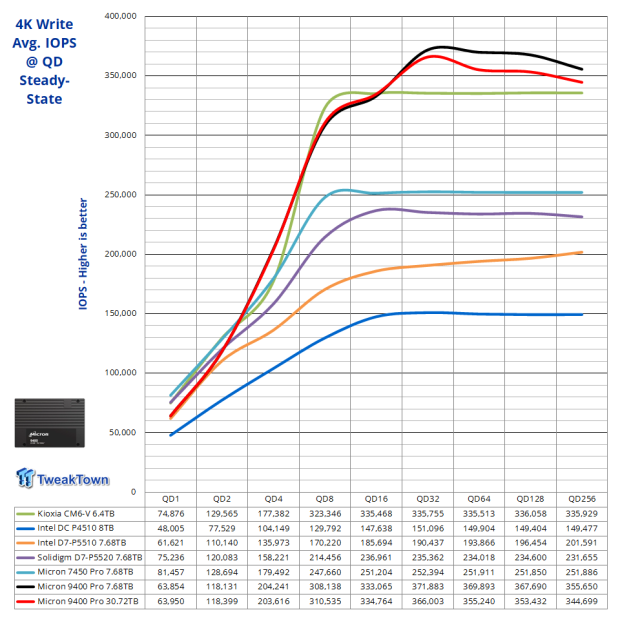
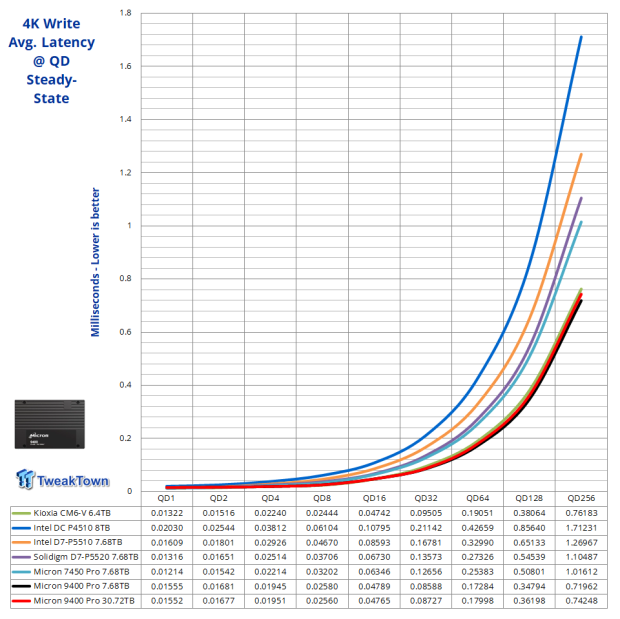
We are hitting a max of 366,000 4K random write IOPS which is 66K better than the stated sustained 4K random write spec. By far the best random write potential we've seen from any similarly overprovisioned flash-based SSD we've tested to date. Here we are seeing its 7.68TB sibling generally tracking the same up to QD32. At QD32 and higher, the 7.68TB model has a slight advantage in terms of pure 4K random performance.
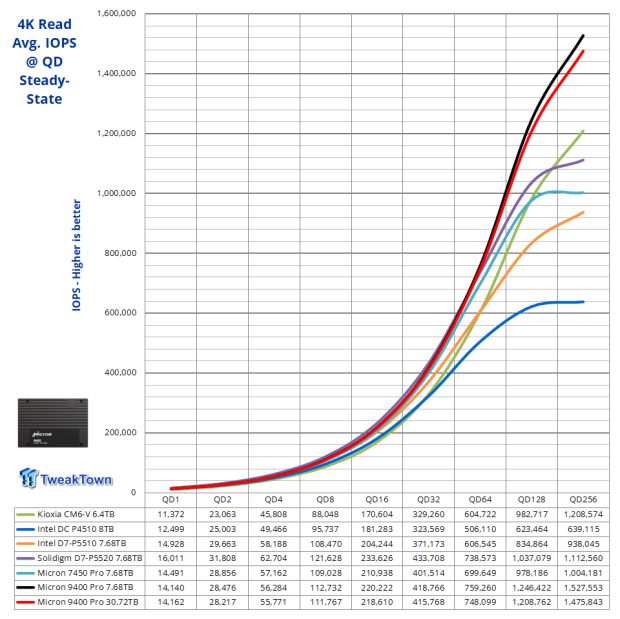
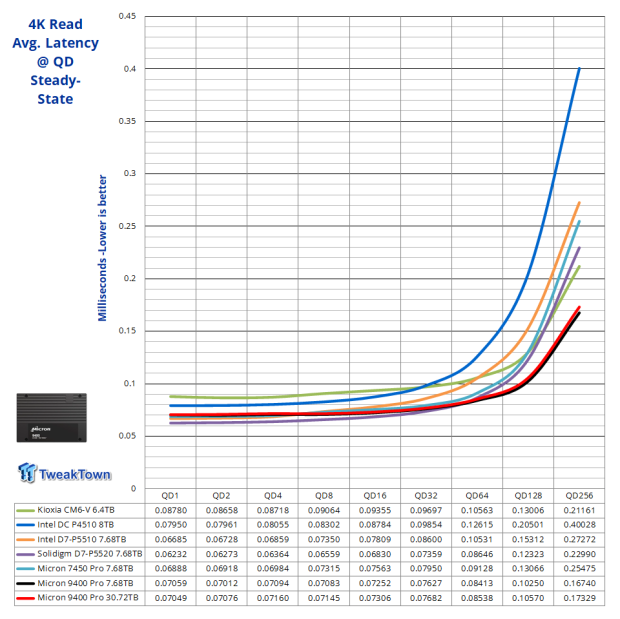
Random read performance is where performance matters most, most of the time, for the majority of use-case scenarios. Micron specs its 30.72TB 9400 Pro as capable of delivering up to 1.5 million IOPS here. At 1.48 million IOPS, we will call it close enough. Outstanding.
8K Random Write/Read
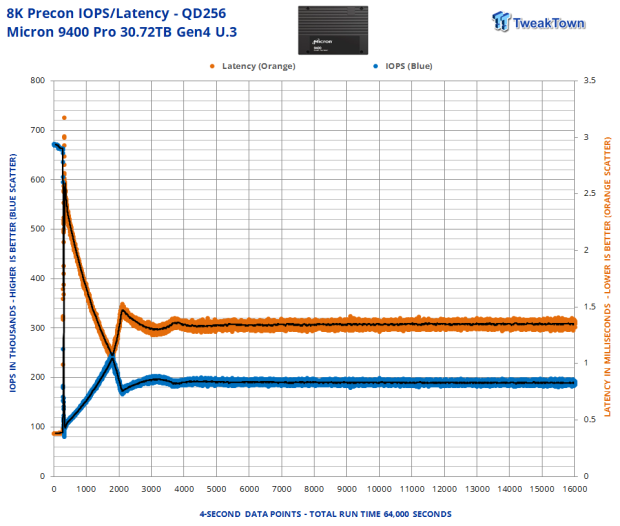
We precondition the drive for 64,000 seconds, receiving performance data every 4-seconds (16,000 data points). We plot this data to observe the test subject's descent into steady-state.
Steady-state is achieved at 28,000 seconds of preconditioning. Average steady-state write performance at QD256 is approximately 190K IOPS. The extremely tight pattern with virtually no outliers indicates high QoS.
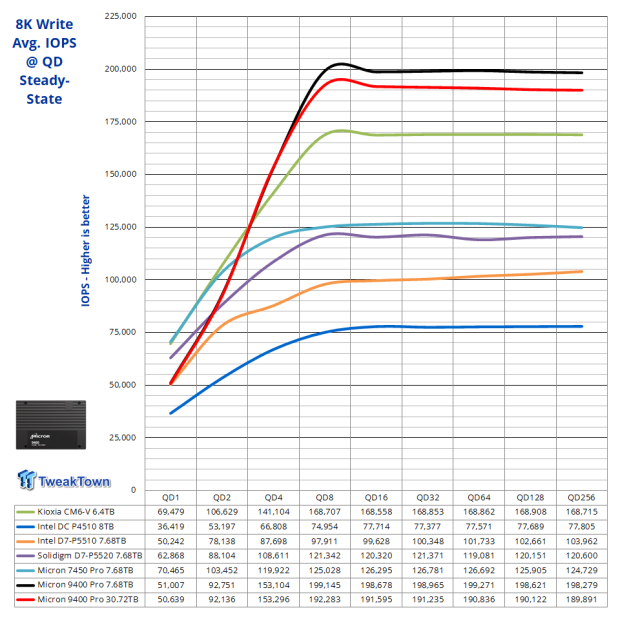
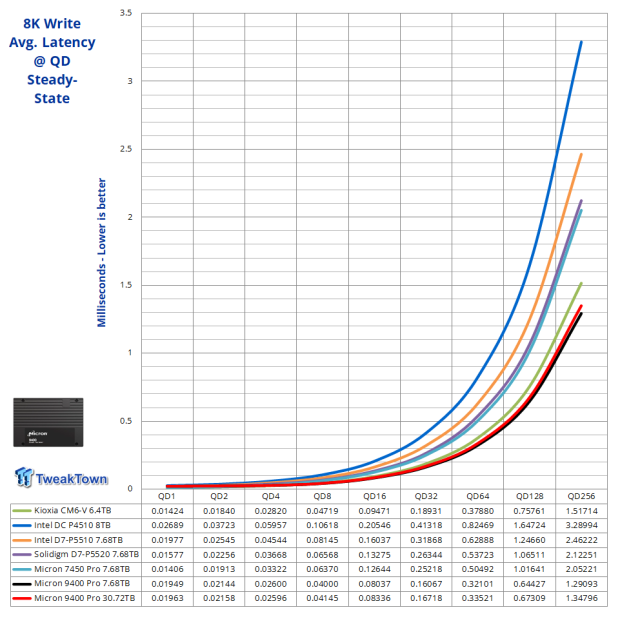
We expect 8K random to track exactly the same as 4K random, just at a lower rate. The 9400 Pro 7.68TB performs as expected, which at its max output is roughly 9,000 IOPS lower than the 7.68TB model. Class-leading performance. Impressive.
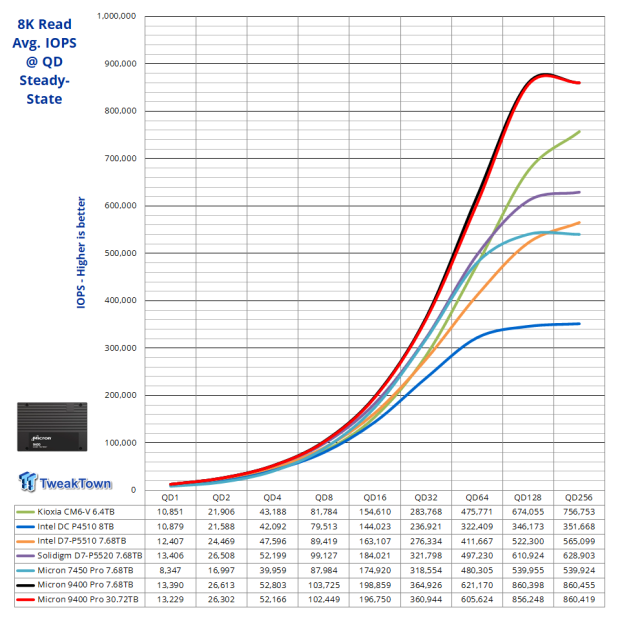
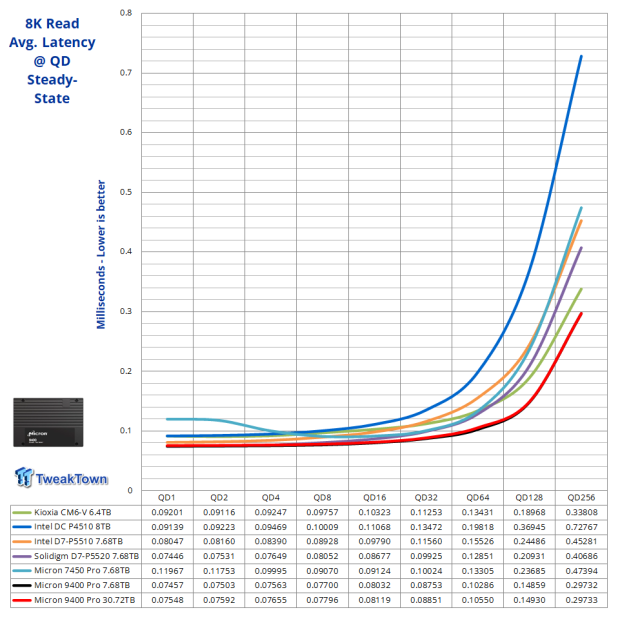
Our 30.72TB test subject delivers virtually identical performance to the 7.68TB model. Again, best-in-class performance.
128K Sequential Write/Read
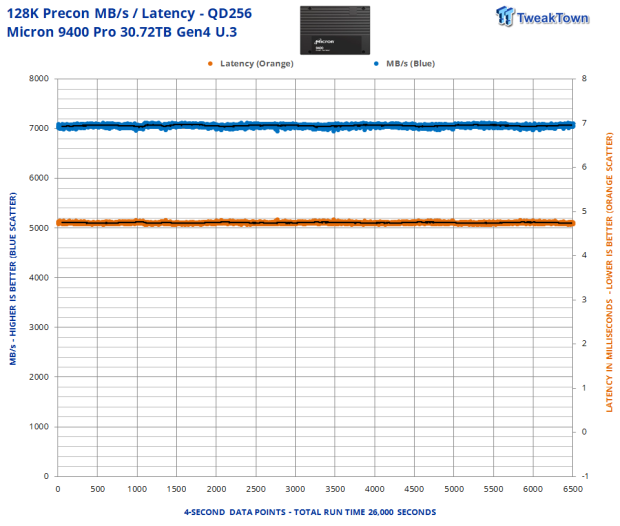
We precondition the drive for 26,000 seconds, receiving performance data every 4-seconds. Steady-state for this test kicks in at 0 seconds. The average steady-state sequential write performance at QD256 is approximately 7,065 MB/s.
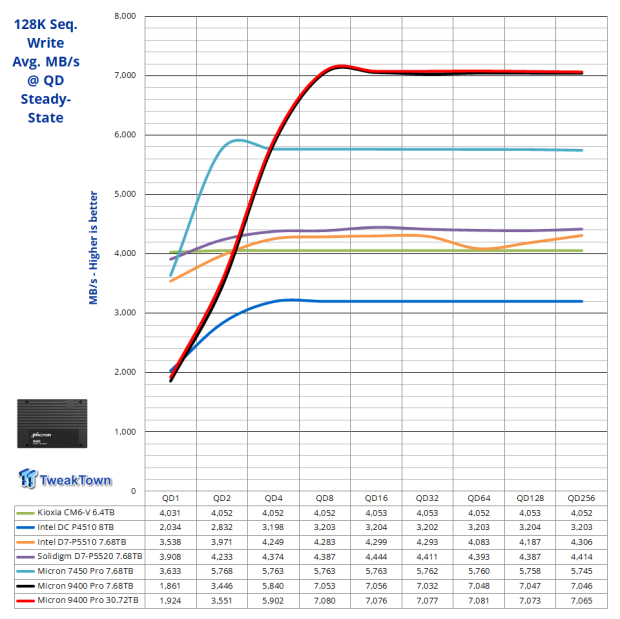
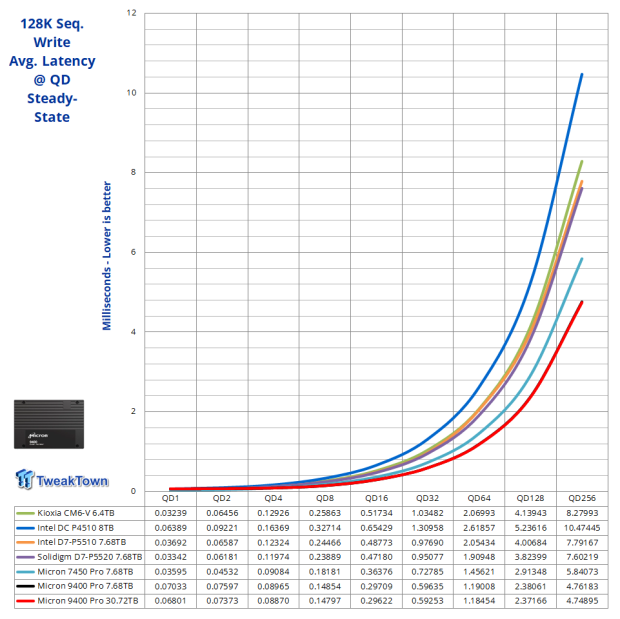
Our ultra-high-capacity test subject does edge out its lower-capacity sibling across the board. This is expected as higher-capacity SSDs tend to deliver more sequential programming throughput.
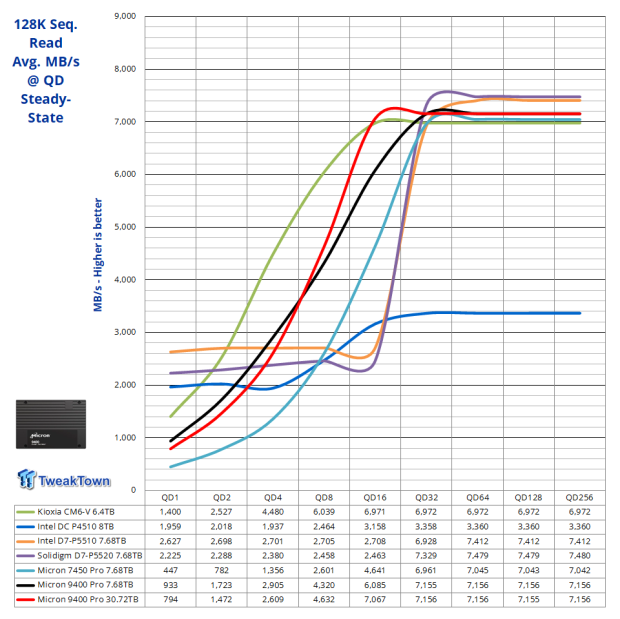
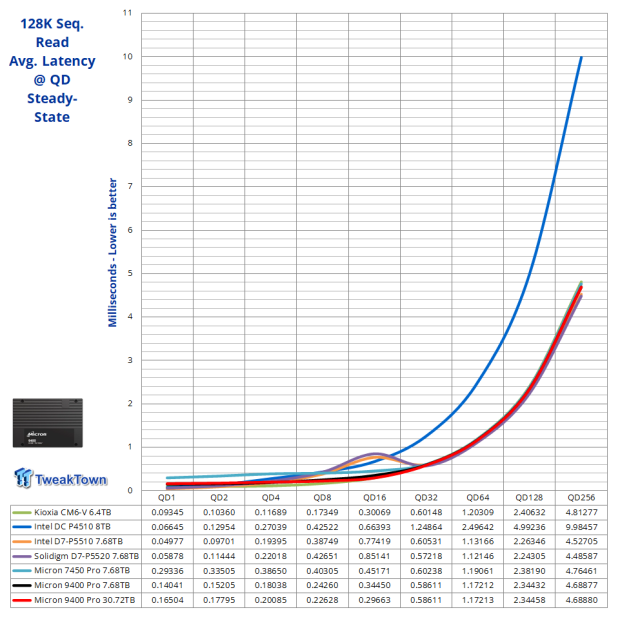
Here we take note of a somewhat differing performance curve between our test subject and its 7.68TB sibling. The lower capacity model is better at queue depths of 1-4, but the 30.72TB model is better at queue depths of 8-16, and both deliver equivalently at queue depths of 32 and higher.
Benchmarks - Server Workloads
Email Server
An Email Server workload is a demanding 8K test with a 50 percent R/W distribution. This application gives a good indication of how well a drive will perform in a write-heavy workload environment.
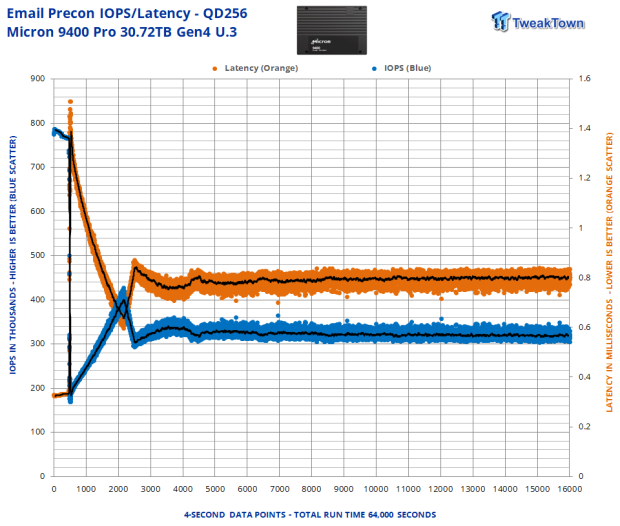
We precondition the drive for 64,000 seconds, receiving performance data every 4-seconds (16,000 data points). We plot this data to observe the test subject's descent into steady-state.
Steady-State is achieved at approximately 44,000 seconds of preconditioning. The average steady-state workload performance at QD256 is approximately 330K IOPS. Our data pattern indicates extremely good QoS, among the best we've seen to date for a flash-based SSD.
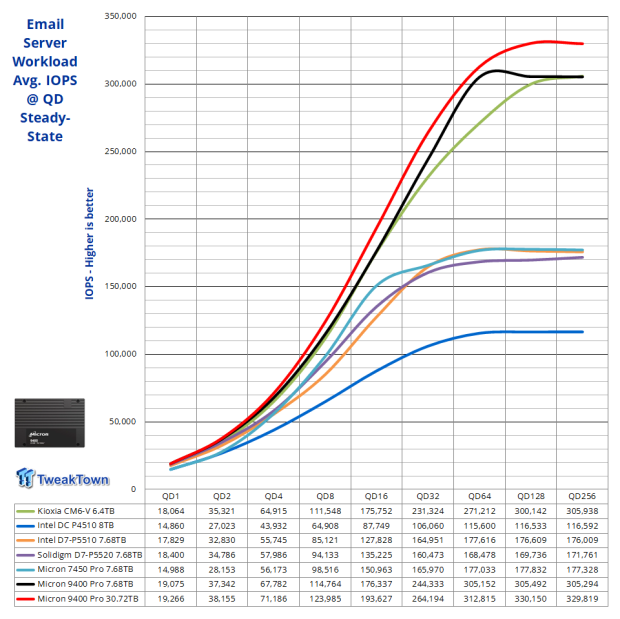
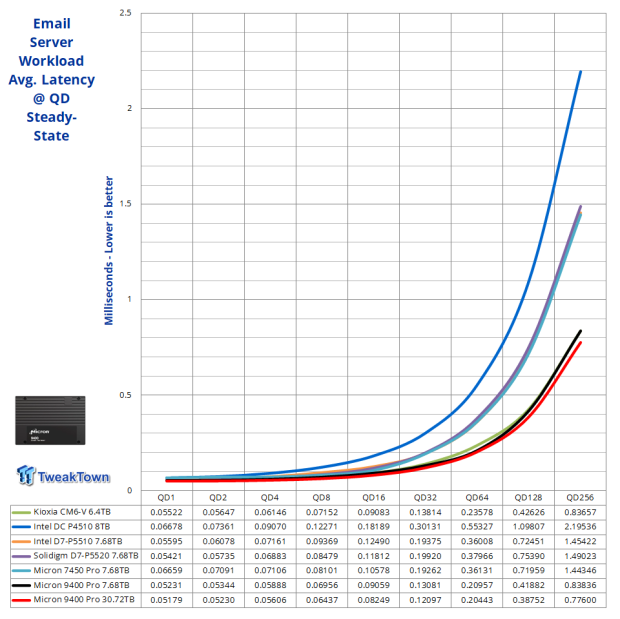
This is performance that matters. Workloads are where the rubber meets the road, and this is where something we didn't expect to see begins to show itself. Based on the engineering challenges presented by basically taking four 7.68TB SSDs and cramming them into one, as well as what "up to" factory specs would seem to indicate, the 7.68TB model should be the better performer of the two.
But that's not what is born out of our real-world simulation. As dominant as the 7.68TB model is over its competition, the 30.72TB model is even better. Incredible efficiency, the best we've ever witnessed.
OLTP/Database Server
An On-Line Transaction Processing (OLTP) / Database workload is a demanding 8K test with a 66/33 percent R/W distribution. OLTP is online processing of financial transactions and high-frequency trading.
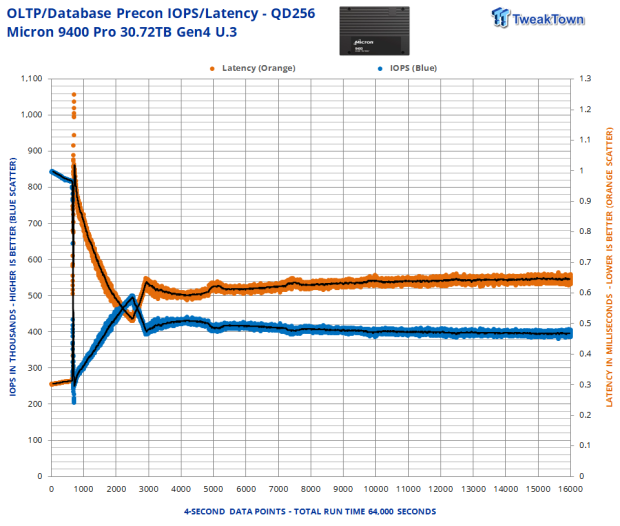
We precondition the drive for 64,000 seconds, receiving performance data every 4-seconds (16,000 data points). We plot this data to observe the test subject's descent into steady-state.
Steady-state is achieved at 60,000 seconds of preconditioning. The average steady-state workload performance at QD256 is roughly 395K IOPS. Again, the data pattern indicates exceptional QoS.
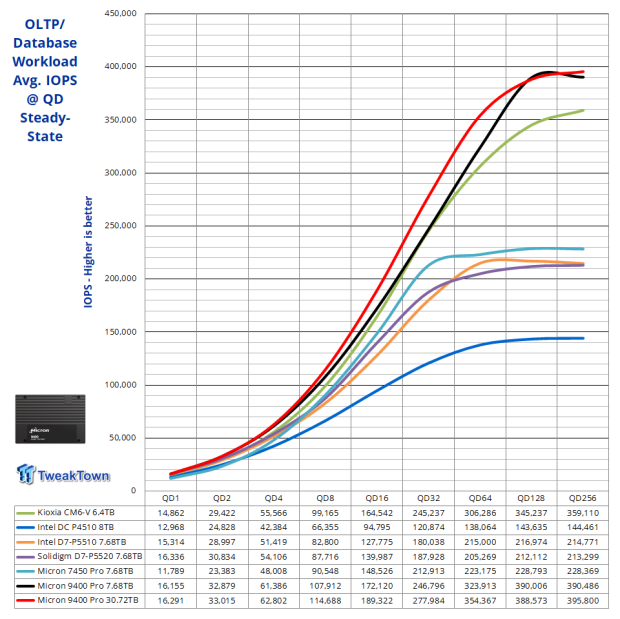
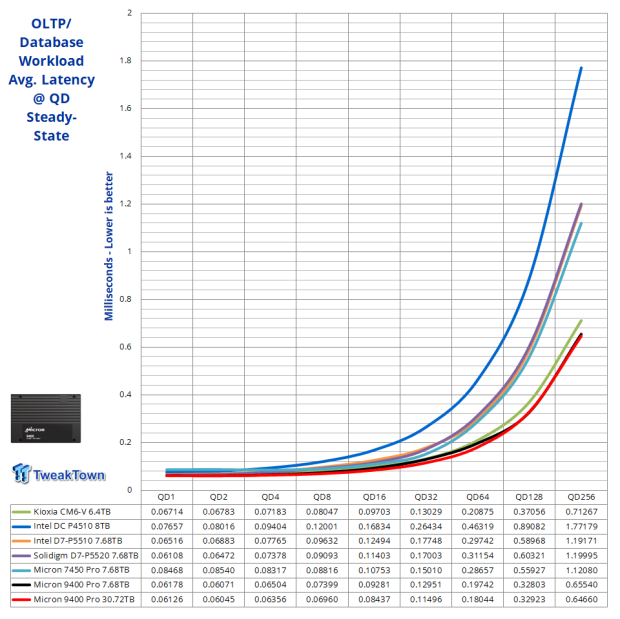
Another lab record for a flash-based SSD. Here again, we are getting unprecedented performance from our test subject where performance matters most, common datacenter workloads. Results here back up what we saw from our Email server testing. The 30.72TB model outperforms the 7.68TB model in real-world simulations. Outstanding.
Web Server
A Web Server workload is a pure random read test with a wide range of file sizes, ranging from 512B to 512KB at varying percentage rates per file size.
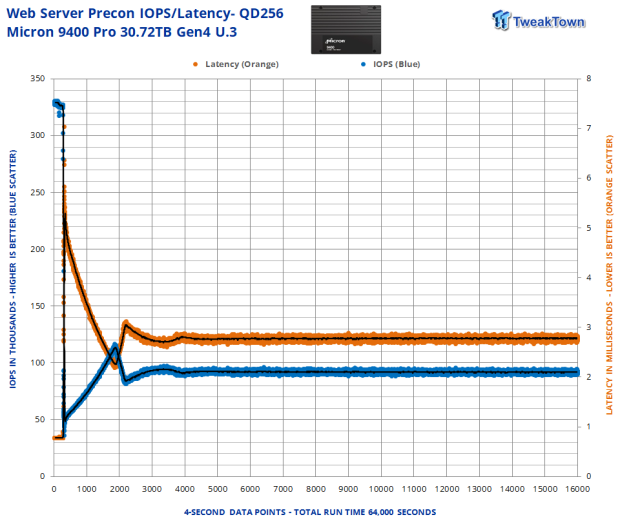
We precondition the drive for 64,000 seconds, receiving performance data every 4-seconds (16,000 data points). We plot this data to observe the test subject's descent into steady-state.
We precondition for this test with an inverted (all-write) workload so that no relevant information can be gleaned from this preconditioning other than verification of steady-state.
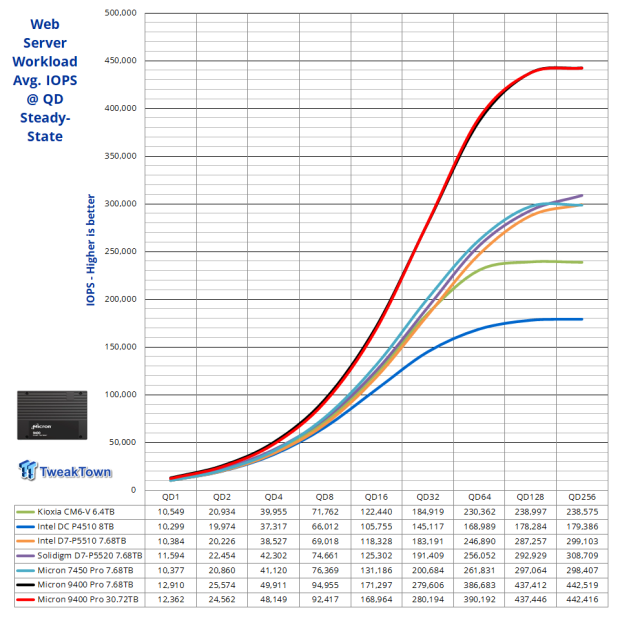
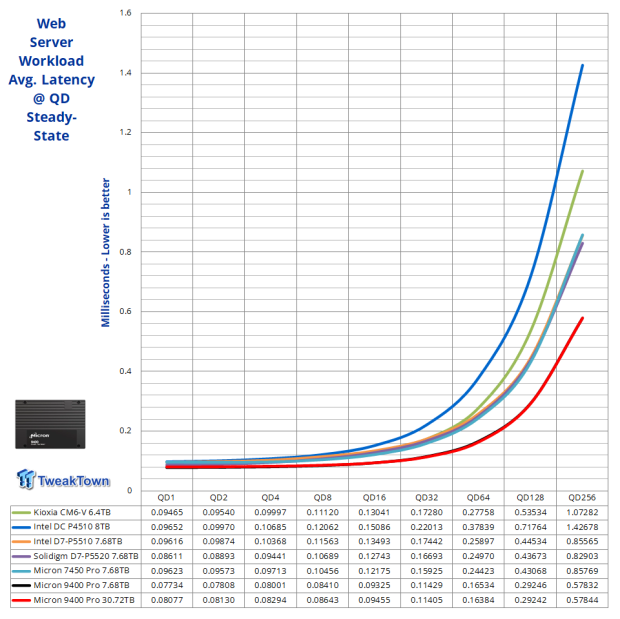
This is an exact repeat of what we still feel is the single most impressive exhibition of performance that matters for any flash-based SSD we've ever tested. 43% more peak performance than its main competition, the D7-P5520 is just astounding considering they are the same class of drive.
Final Thoughts
Micron's 9400 Pro 7.68TB demonstrated what the full potential of Micron's B47R flash truly is in terms of performance that matters. We didn't expect that its ultra-high-capacity sibling could push the envelope even further. Amazing.
Due to its unprecedented capacity, proper testing required more than 150 hours and roughly 16.5 petabytes of data to accurately determine its true steady-state performance metrics. An unprecedented amount of testing and data to process for us as well as for the drive to endure. And how did the drive fair after all this brutality?
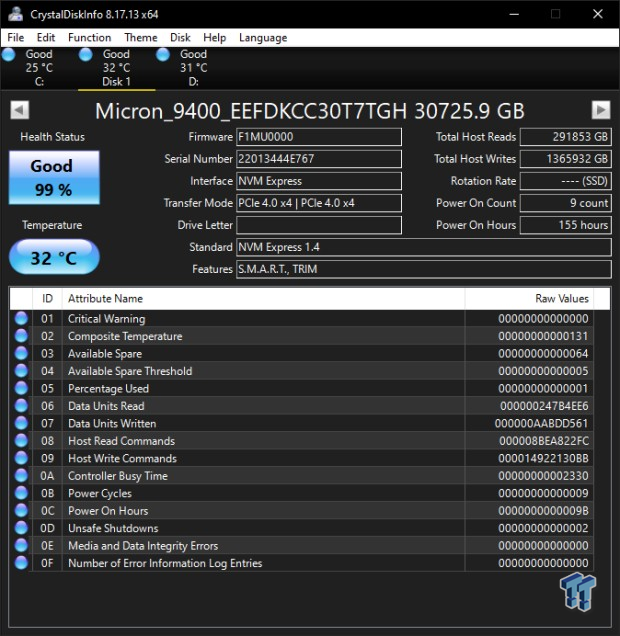
Barely a scratch. 99% of life left in the tank. Impressive.
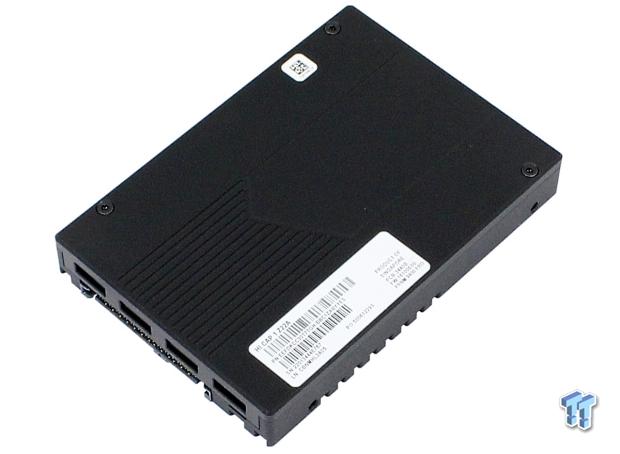
Micron's 9400 Pro 30.72TB is, as we see it, the most efficient datacenter SSD available at this moment in time. Unprecedented TCO, which is defined as footprint, IOPS per watt, and per device density. Performance at a higher level, the Master of Efficiency. Editor's Choice.

